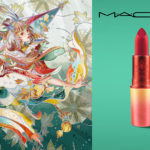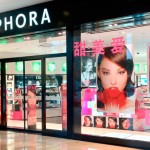Sephora in China
Sephora: legend of beauty
Sephora is a world-famous chain cosmetic store. It was established in 1969 in Limoges(里摩日) France. The name “Sephora” comes from Moses of the Holy Bible, a beautiful, wise, brave and generous young man, standing for elegance, joy, and freedom. Moses’ ideals match perfectly with the operational strategy of the company. At first, people could only buy cosmetics at the desks of department stores. Mr. Dominique Mandonnaud, the founder, did not like this and designed a new method to serve his customers that allowed them to be free to look around, to consume, and to explore beauty. Customers found it more convenient and in year 1997, the world’s No.1 luxury brand company LVMH acquired Sephora. Now, it has stores in 33 different countries. Sephora in China has localized their marketing very well.
Sephora’s development history in China
Sephora first explored the Chinese market in April, 2005, when it opened its first brand shop in Shanghai. The interior design and decorations of its stores reflect the newest global standard. The interior arrangement of its stores is always changing to meet the latest trends. However, the goods sold in China are not simultaneously sold in European shops. There are also products that are unique to China such as SkinVital, Fusion Beauty, and For Beloved One.
Sephora’s ambitious exploration of China’s market now has effect. Up to 2020, it has over 230 shops in 74 big cities like Beijing, Chongqing, Tianjin, and those in the Pearl River Delta.
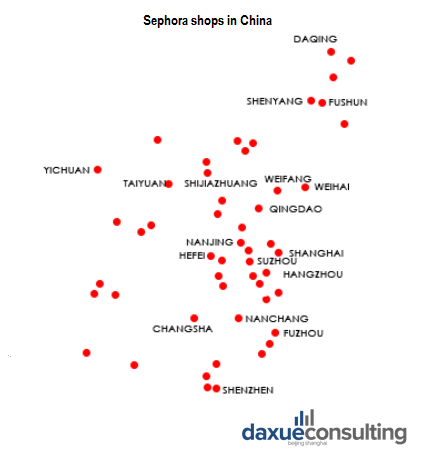
[Source: sephora.cn, location of Sephora shops in China]
Today, e-commerce in China is developing very rapidly. Sephora is looking to take advantage of this trend, and created an official website for online shoppers in China. Compared to the prices in its retail stores, prices of the same goods on the online store are often lower. Besides, there are occasionally additional discounts for online shoppers. The classification of goods on the website is clear and easy to understand, and customers can see comments and reviews of products from previous customers.
Sephora’s new retail concept in China
According to a survey of the “White Paper on China’s New Generation Fashion Consumption 2018”, store atmosphere has become the first option for the brand to have a good impression on customers.
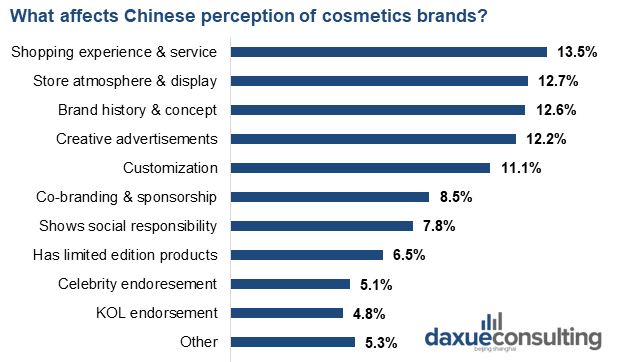
[Data Source: luxe.co ‘White Paper on China ’s New Generation Fashion Consumption 2018’, what affects Chinese consumer perception of cosmetics brands]
The launch of the concept store is an important measure taken by Sephora in the Chinese market in response to the changing demand and consumption habits of Chinese consumers. Nowadays, the new generation of consumers is more rational and independent.
Sephora China has always been at the forefront of technological innovation in beauty. In recent years it has launched a series of pioneering attempts in store innovation. The new concept store in Shanghai continues the digital development of Sephora. Using digital technology to empower retail and create a differentiated in-store experience has become one of Sephora’s core strategies.
First in Asia concept store in Shanghai
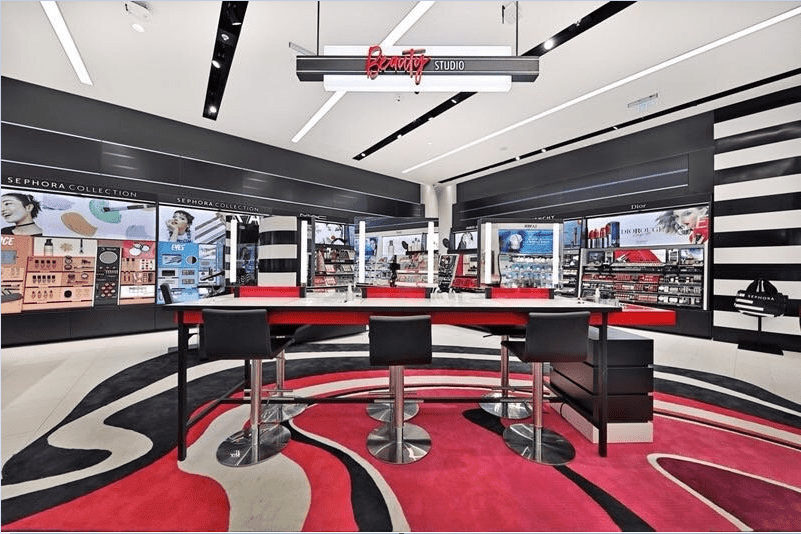
[Source: luxe.co, First Sephora concept store in Shanghai]
In 2017 Sephora in China opened its 200th store in Shanghai. It introduced the new Beauty Studio, bringing the experience of an exclusive makeup room to Chinese consumers. The super large mirror in the middle of the concept store is very eye-catching. In fact, this is a high-tech mirror with “Ecommerce Wall” function. Sephora hopes to bring consumers a refreshing beauty shopping experience from store image, brand category, service to technology interaction.
The whole process is almost the same as that of regular online shopping, which is very simple. Customers can find all products owned by Sephora on the “Cloud Shelves” through manual search or voice search. Then customers can place a single order to receive the goods at home. If the customer does not want to pick up the goods, he can also try the product in the store and place an order directly on the “cloud shelf”.
In addition, the new concept store introduces electronic shelf labels instead of traditional paper price labels. It is not only more environmentally friendly, but also eliminates the situation of manually changing price tags.
AR makeup technology
The Beauty Studio of the new concept store has placed an AR makeup device. This is a “virtual makeup mirror” that Sephora and Meitu created to provide customers with a cross-brand makeup test experience.
It allows to test makeup on face, eyes, lips and eyebrows using blush, foundation, eye shadow, eyeliner, eyelashes, lip gloss and eyebrow pencil. Customers can choose various types of products according to brand, texture or color system. Sephora in China also displays various makeup tutorials through the electronic screen.
In recent years, beauty retailers including Sephora and many other cosmetic brands in China have embraced the virtual makeup technology. It has become a key force to promote beauty brand sales and consumer participation.
Sephora in China: key to success
The key to Sephora’s success in China is its attitude to provide customers with the best service. The size of its target market is not great, but it receives almost 100% praise and approval from its customers. The shops are highly professionalized and people are comfortable knowing that they are going to receive a quality product if they make a purchase. Also, it provides free beauty advisory services to customers.
Creating an all-channel social retail experience in China
Sephora in China has a very comprehensive multi-channel e-commerce strategy. It uses multiple online channels to sell products, such as sephora.cn, WeChat, Tmall, and JD.com.
Sephora.cn offers an amazing opportunity for customers to learn about beauty, while WeChat provides some special offers. It also enables Sephora in China to capture more potential users. User WeChat authorization helps Sephora to accumulate user data and analyze their portraits to conduct more accurate marketing. In addition, the small program has created a closed loop of WeChat’s internal e-commerce ecosystem. Sephora in the Chinese market uses WeChat’s social interaction function to guide traffic and even achieve sales conversion. For example, users can share their favorite products with WeChat friends, who can further shop in Sephora.
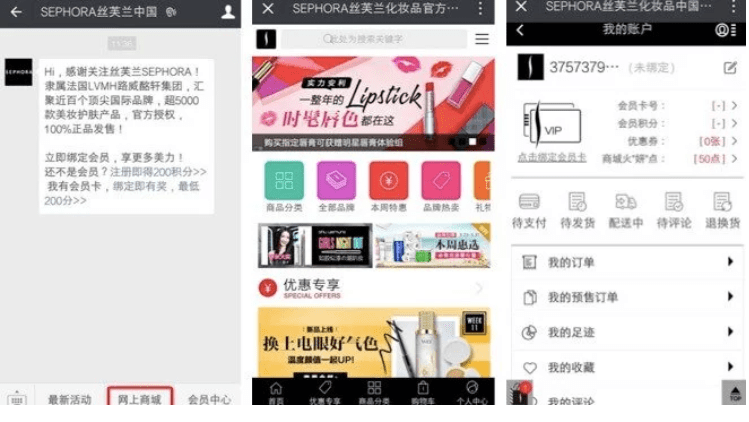
[Source: chozan, Sephora WeChat Account]
With the launch of the mini-program, Sephora implemented new retail functions such as social interaction, membership center and gift card. With the development of mobile e-commerce, it has created a multi-scenario social shopping experience.
- All products on the Sephora app are set up for external link sharing, including WeChat, Weibo and QQ friends.
- WeChat public account sets the “shopping” option in the lower menu bar, which can directly reach the Sephora app.
- Official Weibo account currently has more than 1.26 million followers, and each original push will link to Sephora’s official website.
- Sephora’s official flagship stores opened on Tmall and JD.com – online Chinese giants
The launch of this small program represents Sephora’s in-depth promotion of the image of the global cosmetics retail authority. It also opens the business module of Sephora’s omni-channel marketing community operation.
Introduction of high-value exclusive brands in China
In the face of fierce competition in the cosmetics market, Sephora in the Chinese market continues to strengthen its own brand product line. Sephora’s strategy in China is to attract more beauty brands to enter an exclusive partnership. Currently, Sephora’s exclusive brand covers the whole category of skincare, make-up and other products, for both female and male beauty consumers in China.
The new generation of Chinese consumers is more knowledgeable and sensitive to beauty trends. Therefore, make-up retailers must invest in differentiation to capture this more sophisticated generation of consumers. Exclusive brands are becoming the backbone of Sephora’s strategy in China. For example, Skin Inc., a Singapore-based customized skincare brand officially entered the Chinese market through Sephora in 2018. The proportion of Chinese local beauty brands in Sephora is increasing every year. In addition to the high-end lines of WEI (蔚蓝之美), Marie Dalgar (玛丽黛佳) and Color Studio, several new Chinese local brands, such as LEANON (两两) have also settled in recently.
Sephora in China: further brand development
Sephora’s plans in China: integrating beauty shopping, education and entertainment
Benjamin Vuchot, Sephora’s President in Asia, claimed that Sephora’s Chinese customers expect to experience beauty shopping, beauty education and entertainment. In fact, Sephora has been working on beauty education for years, and it hopes to share its expert knowledge on trends and skincare with consumers via teaching and sharing.
Recently personalized customization and styling services have become the greatest demand of young consumers. Daily make-up trials and make-up classes have become an important way for Sephora to deliver beauty make-up education. Beauty Advisor program has become its key driving force. Sephora is a great educational space. For example, many Sephora clients come in and consult a beauty advisor for the latest product or make-up look. It’s all part of experience retailing, not just a business transaction.
Sephora in China plans to use KOL marketing to attract customers
Establishing a cooperative relationship with Chinese Beauty KOL has become an important part of global beauty marketing. In China, social media platforms have great influence and provide a huge space for the discussion of beauty topics. Sephora in the Chinese market is also planning to constantly establish contacts with the KOL. It hopes that KOL can receive content through marketing activities, so that they can spread Sephora’s voice to fans.
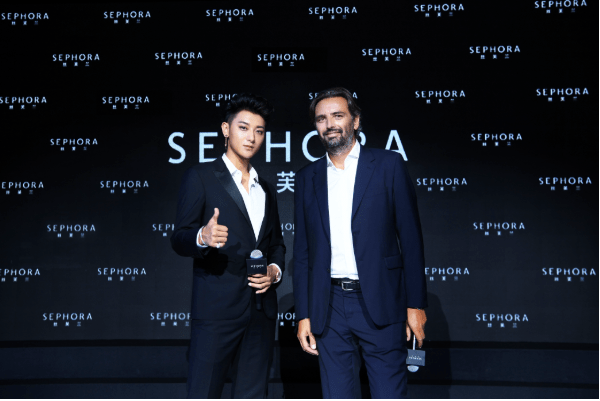
[Source: Photo courtesy of Sephora, Z.Tao poses with Benjamin Vuchot, Sephora President in Asia in Shanghai on August 31, 2018]
Sephora ’s strategy in China is to cover the major fields of the beauty industry, lifestyle, and fashion. With the rise of social media, brand owners see high potential in “new KOLs” such as “Internet celebrities and talents”. In 2017 the average price of transaction orders of KOL customers of WeChat beauty and makeup increased by nearly 360% from the previous year.
In 2018 Sephora in China invited four KOLs to promote a Christmas marketing activity. According to Sephora ’s official data, within the first 7 days of campaign, more than 10,000 people have participated in the online live broadcast, with a total of nearly 40 million views.
Sephora’s strategy in China is a great example to learn from. In 2018, Sephora selected 10 beauty bloggers for KOL marketing worldwide. To promote this new development, Sephora signed a contract with Chinese artist Huang Zitao. The former, Exo boy band member became famous as a solo artist and actor. The signing of Huang Zitao also brings Sephora closer to young consumers.
Listen to 100 China entrepreneur stories on China Paradigms, the China business podcast
Listen to China Paradigm on Apple Podcast
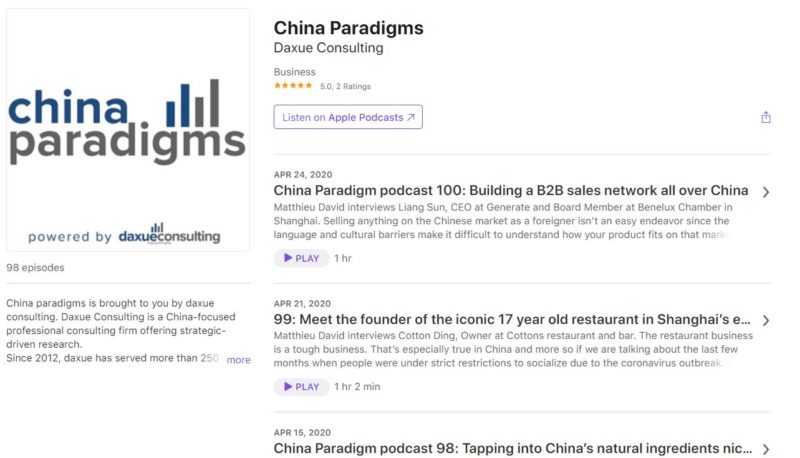


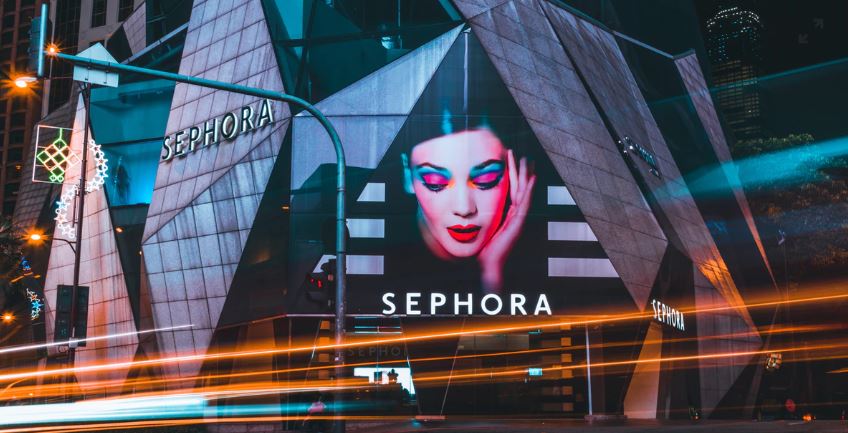

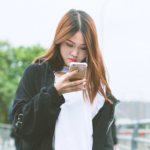


![[Podcast] China paradigm episode #11: How to successfully increase the number of retail shops in China by five-fold](../wp-content/uploads/2018/11/Cover-Episode-11-150x150.jpg)
